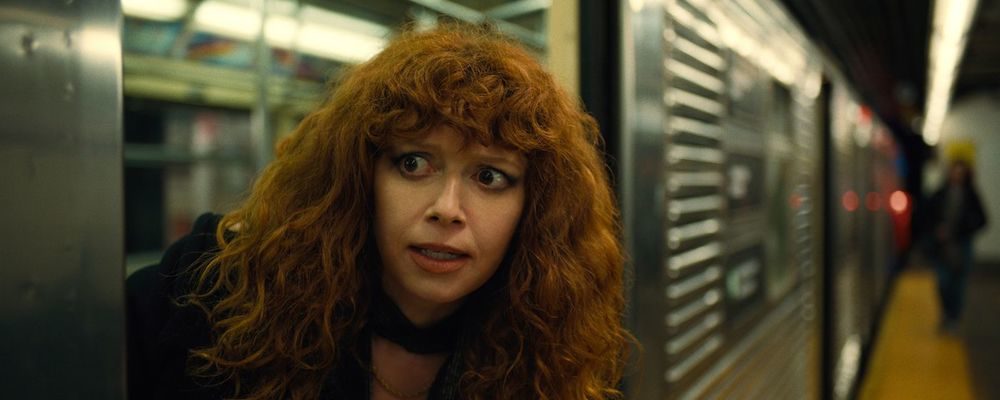‘Russian Doll’ Keeps It Hilariously Surreal in Time-Traveling Second Season
Alci Rengifo
When Netflix’s “Russian Doll” premiered three years ago, it proved engrossing by using the “Groundhog Day” format of entrapping its lead in an endless time loop. Scrappy New Yorker Nadia Vulvokov (series co-creator Natasha Lyonne) was on the verge of her 36th birthday when we first met her, then began a journey of self-reflection bursting with wonderful TV surrealism. After such a lengthy absence, the show now wisely expands her journey by turning to a plot device that on paper might seem rather cliché. Time travel is on the agenda this season, but instead of feeling like a rehash, “Russian Doll” becomes even more of a funny, evocative story. It’s not about changing the past, but about looking at it in the face. Maybe that’s the only way to truly figure out why we are who we are.
Now Nadia is nearing her 40th birthday. Bestie Maxine (Greta Lee) wants to throw a party but Nadia would rather be careful, preferring to celebrate quietly with Alan (Charlie Barnett) and avoid any weirdness. Normality is not in the cards, however. After leaving her adopted mom Ruth (Elizabeth Ashley) at the hospital, Nadia boards a downtown train. Immediately she notices that she has left the 2020s and is in some other time, which turns out to be 1982. It’s a time without cell phones and the Guardian Angels safety patrol walk around the subway stations. While Nadia is conscious something is once again off, she tries her best to maneuver around the environment. After meeting a guy named Chez (Sharlto Copley) at a bar, Nadia makes a stunning discovery when she looks in the mirror: She has taken on the form of her biological mother, Lenora (Chloë Sevigny), who had a history of mental illness. This may also be Nadia’s chance to answer an old family mystery regarding gold krugerrands the family had brought over from World War II Europe, but of which only is left, as a pendant Nadia wears.
There is an existential spirit in a particular kind of Peak TV where millennials are using drama to take deep look into what shapes an individual. “Russian Doll” is a surreal cousin to shows like “Undone” and “PEN15,” which are obsessed with memories and family trees. What Lyonne and co-creators Leslye Headland and Amy Poehler make clear this season is that Nadia is the whole point, not the time travel gimmick. The show does have fun recreating life in the ‘80s in a way that contributes to the story while having fun with nostalgia. Nadia emerges from the train into 1982 New York City where someone gives her a pamphlet warning about nuclear war with the USSR. When she needs to find Chez the only available tool is the phone book. There are no computers at the public library, so you can leave informational inquiries at the front desk where the librarian claims she’ll call you with the results. Bands like Depeche Mode are all over the soundtrack as well. Later, Nadia will also travel to 1944 Budapest during World War II. Even if the meticulous production design changes into yet another era, the focus is Nadia’s emotional journey to uncover more of her family legacy.
The nostalgia in this season of “Russian Doll” goes into a deeper, psychological level than in other similar premises. Nadia’s struggles with the world can be funny, but there’s no cute, “Back to the Future” goal here. The whole angle about the gold krugerrand that goes missing in the first episode, potentially stolen by Chez, initiates a road towards finding answers to heartbreaking questions. Lenora’s fate was hinted at in the first season. It is believed she committed suicide on the even of her 36th birthday after Ruth was given custody of Nadia. Now literally embodying her mother, Nadia gets to walk in her shoes and make comparisons. Was her mother wild and out of control? And if so, will Nadia turn out the same way? There are also more links uncovered to past family history involving Nadia’s grandmother surviving the Holocaust, which casts its own shadow over subsequent generations. Maybe Nadia’s character has been shaped by traumas passed down the generations. Her impressive, strong-willed grandmother passed on trauma to Lenora, which then channels into Nadia. There are some moving moments in the second episode of the season where Nadia meets the younger version of her aunt, who is longer an aged woman but someone undergoing emotional turmoil.
As with the first season, the acting also drives the narrative forward with some great zest. Natasha Lyonne is all chutzpah as Nadia, who is nearing 40 and still feels out of place. She’s still young but feels like life can’t really move forward until she unlocks certain things about herself, which tend to be those inner questions we sometimes don’t even know how to ask. While some of the side characters like Maxine are mostly there for comic relief, Alan does get a richer storyline where he time travels as well to 1962 East Berlin during the Cold War-era. He becomes his own kind of time traveler, searching for different links to his past other than Nadia, but with no less important results for his life. “Russian Doll” plays around with time and space, but in the end, it’s about people. Diving into our pasts and deciphering our family trees can feel surreal, heart-wrenching and illuminating. This show knows how to touch on these moods with heart mixed with glee.
“Russian Doll” season two begins streaming April 20 on Netflix.

